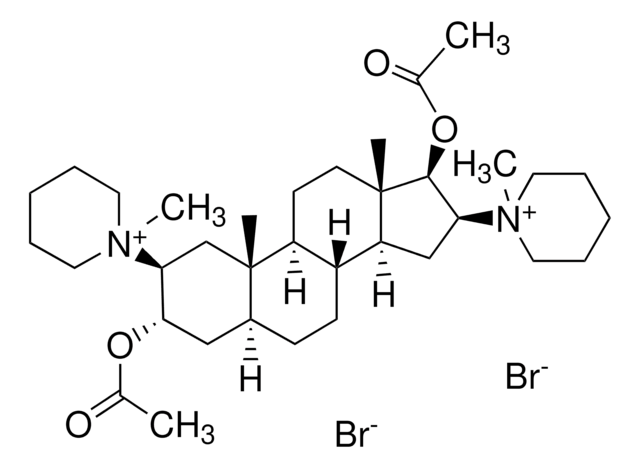N2001
Neostigmine bromide
≥98% (HPLC and titration), powder
Sinónimos:
3-(N,N-Dimethylcarbamoyloxy)-N,N,N,-trimethylanilinium bromide, Prostigmine
About This Item
Productos recomendados
assay
≥98% (HPLC and titration)
form
powder
color
white
mp
175-177 °C (lit.)
solubility
H2O: 1 g/mL
ethanol: soluble
SMILES string
[Br-].CN(C)C(=O)Oc1cccc(c1)[N+](C)(C)C
InChI
1S/C12H19N2O2.BrH/c1-13(2)12(15)16-11-8-6-7-10(9-11)14(3,4)5;/h6-9H,1-5H3;1H/q+1;/p-1
InChI key
LULNWZDBKTWDGK-UHFFFAOYSA-M
Gene Information
human ... ACHE(43)
¿Está buscando productos similares? Visita Guía de comparación de productos
Application
- to control reaction specificity of acetylcholinesterase in coronal organ of Botryllus schlosseri.
- to study its effects on abnormal contraction of pyloric circular smooth muscle strips (PCSMS).
- to study its effects on depolarization of bag cell neurons.
Biochem/physiol Actions
Features and Benefits
signalword
Danger
Hazard Classifications
Acute Tox. 1 Inhalation - Acute Tox. 2 Dermal - Acute Tox. 2 Oral - Eye Irrit. 2 - Resp. Sens. 1 - Skin Irrit. 2 - Skin Sens. 1 - STOT SE 3
target_organs
Respiratory system
Storage Class
6.1A - Combustible acute toxic Cat. 1 and 2 / very toxic hazardous materials
wgk_germany
WGK 3
flash_point_f
Not applicable
flash_point_c
Not applicable
ppe
Eyeshields, Faceshields, Gloves, type P2 (EN 143) respirator cartridges
Certificados de análisis (COA)
Busque Certificados de análisis (COA) introduciendo el número de lote del producto. Los números de lote se encuentran en la etiqueta del producto después de las palabras «Lot» o «Batch»
¿Ya tiene este producto?
Encuentre la documentación para los productos que ha comprado recientemente en la Biblioteca de documentos.
Los clientes también vieron
Nuestro equipo de científicos tiene experiencia en todas las áreas de investigación: Ciencias de la vida, Ciencia de los materiales, Síntesis química, Cromatografía, Analítica y muchas otras.
Póngase en contacto con el Servicio técnico











